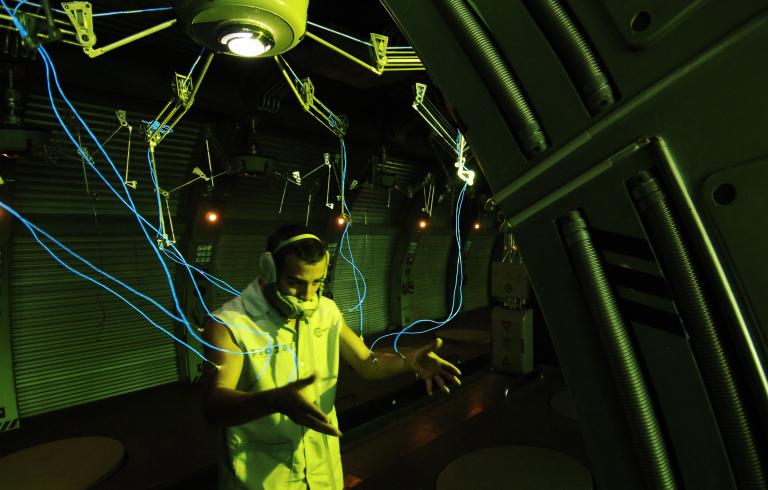
Carson Center hosts research Flyover Summit Oct. 21-22
calendar icon13 Oct 2021

Lincoln, Neb.--The Johnny Carson Center for Emerging Media Arts will host Flyover Summit Oct. 21-22, which will bring together research about rural-urban systems design and environmental futures.
“The rural is, as we see it, undergoing transformations around human and human-driven density,” said Assistant Professor of Emerging Media Arts Ash Eliza Smith from the Carson Center. “While populations may be migrating to the cities, rural spaces become evermore a product of human organization and machinic cultivation. Post-pastoral speculation imagines a rural future that is not organized around idyllic countrysides that speak to some utopian natural state (that is actually not natural at all) but rather a rural that is organized by technologies, wildernesses and other forms of circulation. How might it be an arranger? What technologies might be harnessed? How will rural life for humans who are there change?"
Flyover is led by Smith with Professor Stephanie Sherman, a course leader in narrative environments at Central Saint Martins in London.
“Flyover is a creative think tank developing research about rural design and environmental futures,” Smith said. “This all started out of conversations with scientists, engineers and more about their work here at UNL. We start from our home in Nebraska, but our inquiries extend nationally, globally and into outer space. We bridge science, technology, art, and design to consider the production, allocation, and distribution of resources outside cities and towns. We propose alternative ecologies and reflect on the futures, past and present possibilities that shape urban-rural interdependence. We think about how automation and technology are shaping rural systems.”
The Flyover Summit will last two days at the Johnny Carson Center for Emerging Media Arts, located at 13th and Q sts. On Thursday, Oct. 21, a series of virtual short talks by filmmakers, theorists, architects, designers and scientists will discuss rural automation. The lecture shorts will cover such themes as outer space law and governance; rural and Indigenous AI; and machine automation, growbots and Blockchain Chicken Farms.
The keynote speaker is Xiaowei Wang, author of “Blockchain Chicken Farm: And Other Stories of Tech in China’s Countryside.” In the book, Wang explores the political and social entanglements of technology in rural China.
Other speakers include filmmaker, digital media artist and recent MacArthur Fellow Alex Rivera (“Sleep Dealer,” “The Infiltrators”); Benjamin Bratton, artist, author and program director at the Strelka Institute, located in Moscow and San Diego; and Frans von der Dunk, internationally distinguished UNL Professor of Space Law.
On Friday, Oct. 22, a workshop with Alex McDowell’s Worldbuilding Institute will share interdisciplinary techniques for collaborative worlding, fictioning and storytelling for audiences at UNL and beyond. McDowell is a narrative designer (“Minority Report,” “Fight Club”) and the co-founder and creative director of experimental.design.
The conference is free and open to the public.
“Register and drop in anytime throughout the day,” Smith said.
Also launching at the Flyover Summit are Flyover Fictions, which pair designer-storytellers with scientists and engineers at the University of Nebraska–Lincoln to develop design fictions that push existing investigations into speculative and projective domains. Each designer-researcher will develop a design fiction that will be published as a short digital book.
“The project creates a bridge between speculative futures and rural-urban innovation,” Smith said.
For more information and a full schedule of events, visit https://go.unl.edu/flyoversummit2021.
Support for Flyover Summit has been provided by the UNL Office of Research and Economic Development, Global Experiences Innovation Fund, a Hixson-Lied Faculty Research/Creative and Development Grant, and a Nebraska Governance and Technology Fellowship.
For faculty interested in participating in the Flyover creative think tank or for more information, email Smith at ash.e.s.@unl.edu.